Foretales: A Card-Based Narrative Journey is aptly titled. I play as Volepain, a shoebill getting by in a fantasy world as a thief-for-hire alongside his tiger friend, Léo. On a job one day, Volepain touches a lyre that fills his mind with premonitions of burning cities, people turned into feral beasts, and the world draining into a shadowy maelstrom. Volepain and a growing party of companions set out to avert these catastrophes, with every place they visit, person they meet, and action they perform represented by cards laid across a table.
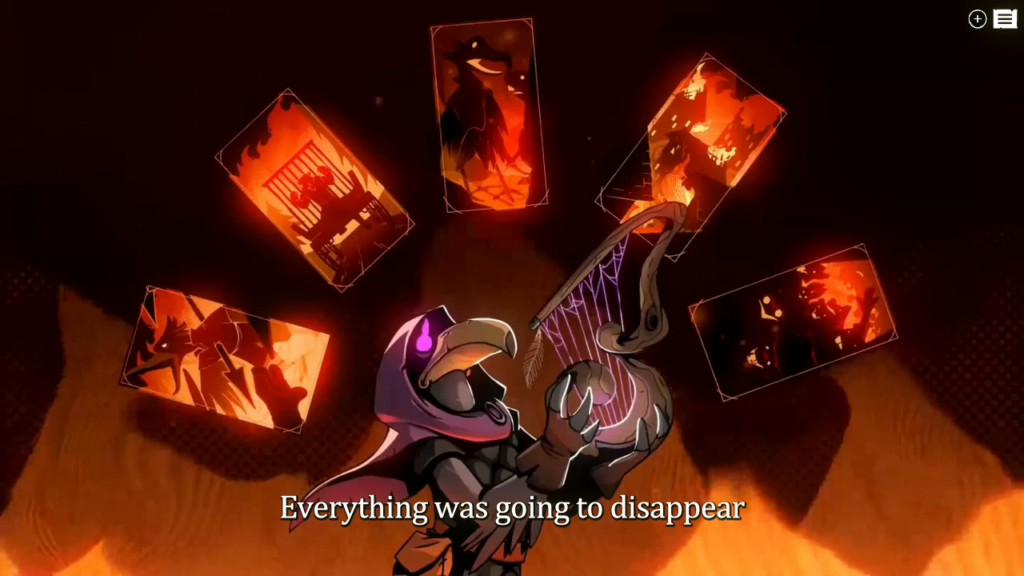
The steps Volepain and his allies take to prevent his apocalyptic visions coming true are represented by a variety of missions with broad, varying objectives. In one, the goal is to resolve a conflict between striking miners and strikebreaking soldiers. In another, Volepain acts as a legal advocate for a retired pirate captain on trial for murder. In a third, the party solves puzzles in a mystical library to find a cure for a zombifying disease. Everything about these missions, from the player characters in Volepain’s party, to the non-player characters they interact with, the locations they visit, and the actions they perform, are represented by cards on a playing field. I progress through a mission by using cards drawn from each character’s deck on the location cards laid in the middle of the table.
Volepain recruits an odd band of followers on his quest, up to two of whom may join him on each mission. He begins his quest accompanied by Léo, another mercenary whose scavenging and hunting skills contrast Volepain’s street-smart thievery. Other recruitable characters include: Karst, a battle-scarred silverback gorilla whose terrifying presence and raw strength is tempered by his most powerful skills damaging his broken body; Pattenbois, a budgerigar pirate who captains her own ship and has many friends in low places; and Sylvia, a ring-tailed lemur who brings healing skills and a gentle touch to the party’s exploits.
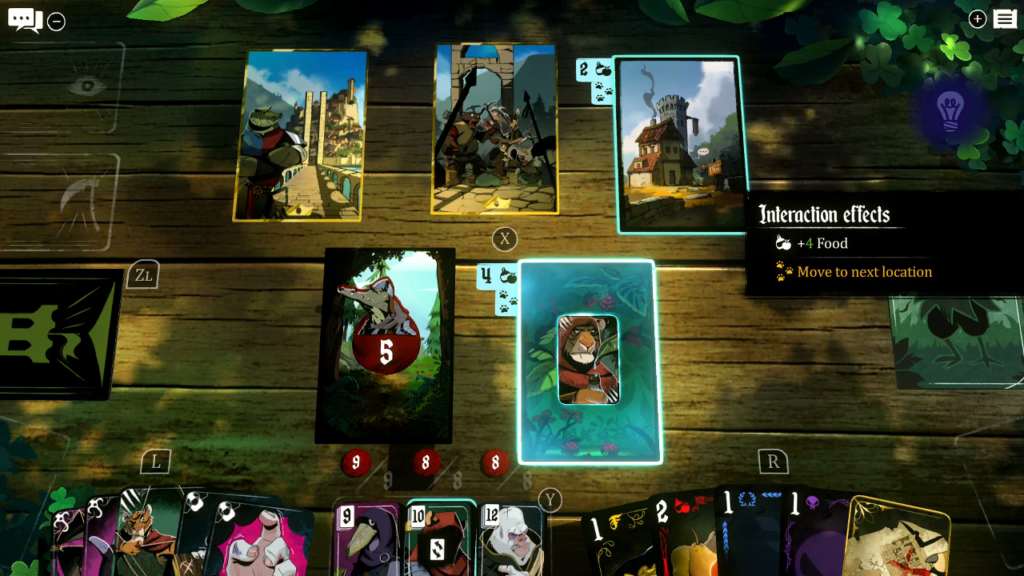
Action cards played from each character’s deck has a different effect on each location card. Using Volepain’s Nimble Hands card on an Inn card can add items like alcohol, gold, and food to the resource deck as Volepain pilfers the patrons’ pockets. Using Léo’s Rallying Cry card on the same Inn will summon the patrons to listen to him. Volepain can then use Eavesdrop on the crowd to get a Local Chit-Chat card, which can be played on other locations or characters to create other effects. Whatever I end up earning from each location, the action card is discarded while the location card is returned to the bottom of its deck and replaced with a new one.
The resources the party accumulates when I play action cards on locations are the fuel that propels them through each mission. Food is the most important. It can be offered to characters in exchange for gold or favors, but its most important function is to reclaim action cards from the discard pile. Without a supply of food to get the cards the party needs, their options become limited quickly.
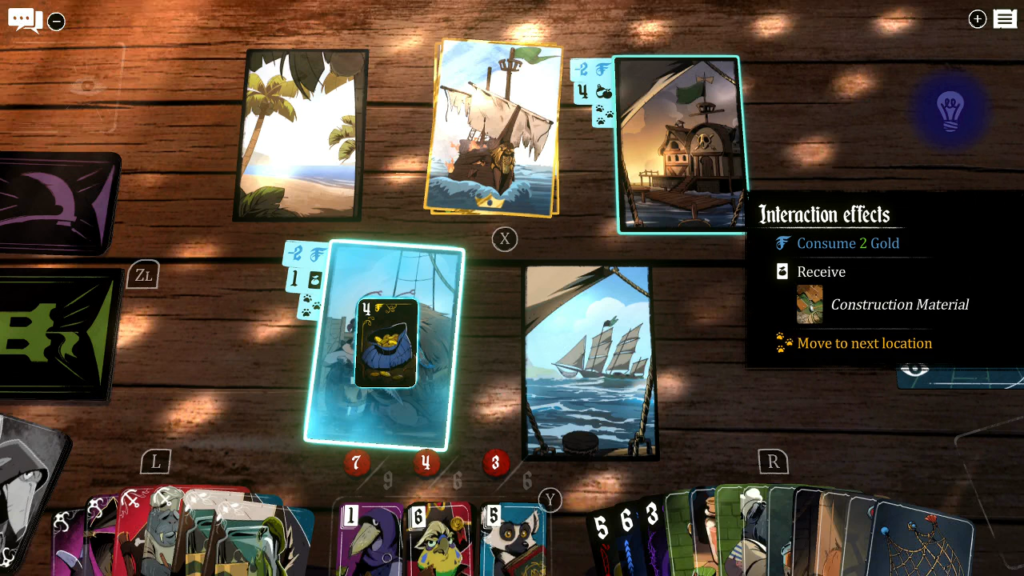
Other resources are less impactful, but no less important. Gold can be spent on other resources. Besides food, lockpicks and alcohol can be purchased from shops and merchants. Lockpicks, of course, can open locked doors and chests, while alcohol can be traded to sailors in exchange for protection for the party. I can also give gold to the many refugees and homeless people Volepain encounters, which earns him fame. Fame is its own currency that can carry the party through respectable parts of the world. It is countered by grim, earned for robbing the poor and killing the powerful, which lets the party intimidate respectable people and gives the party credibility in the world’s most unsavory parts.
In every mission, I keep using action cards to cycle through location cards, accumulating and spending resource cards along the way, until the party discovers the information, the resolutions, or the macguffins they need to continue on with their journey.
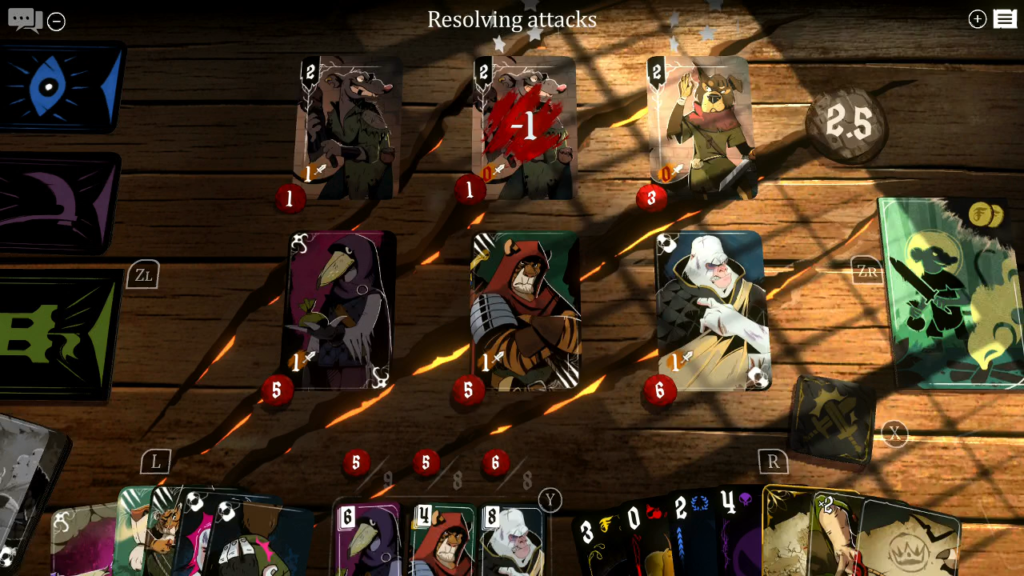
Before I am allowed to interact with some location cards, I must first guide Volepain and his party through a battle with the local threats, be they soldiers, pirates, or people infected by a zombifying plague. Combat is simple. Each member of the party is lined up against each member of the opposing party, and each deals one point of damage to the target across from them. I can use action and resource cards on Volepain’s party to give them buffs that increase the damage they deal and decrease the damage they take. When the entire enemy party is removed from the board, the battle ends.
Combat is harrowing. Even in regular battles against random enemies, Volepain and his companions feel outmatched. Initiating turns without intervening with action cards is a quick way to get everyone killed, and even then it feels like prolonging the inevitable. This is probably meant to encourage me to avoid actually fighting battles. Resources like gold, fame, and grim are helpful with location cards, but their best use is to “corrupt” enemies in battle, sending them away from fights without exchanging blows.
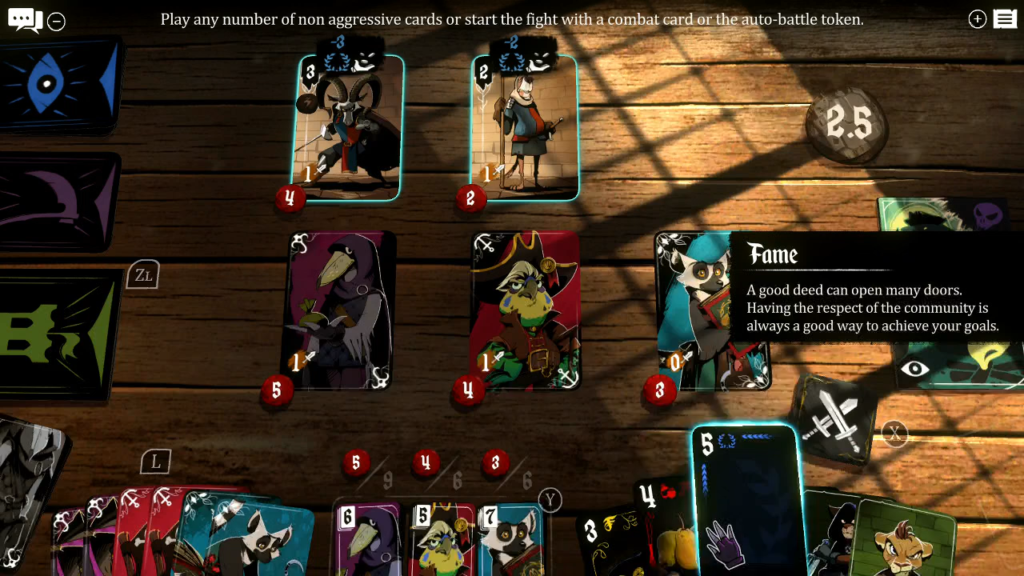
Foretales really wants me to end battles by corrupting enemies with resource bribes. I am repeatedly warned that there are consequences for killing too many opponents. I never fully grasp what these consequences are, and I am never clearly told. Corrupting enemies is preferable, but it burns through my resource cards quickly. Finding a balance between earning resource cards and spending them to avoid battles is key to completing missions successfully.
When I first begin Foretales and throughout its first couple missions, I am enraptured by its concept. I’ve never played a game quite like this before. It is, in spirit, a tabletop card game, but of such complexity and breadth that the only way a player can reasonably experience it is through the form of a videogame. After the third mission, I begin to feel a malaise settling over me. By the fourth mission, I can no longer ignore the feeling that I am repeating the same actions to attain new results.
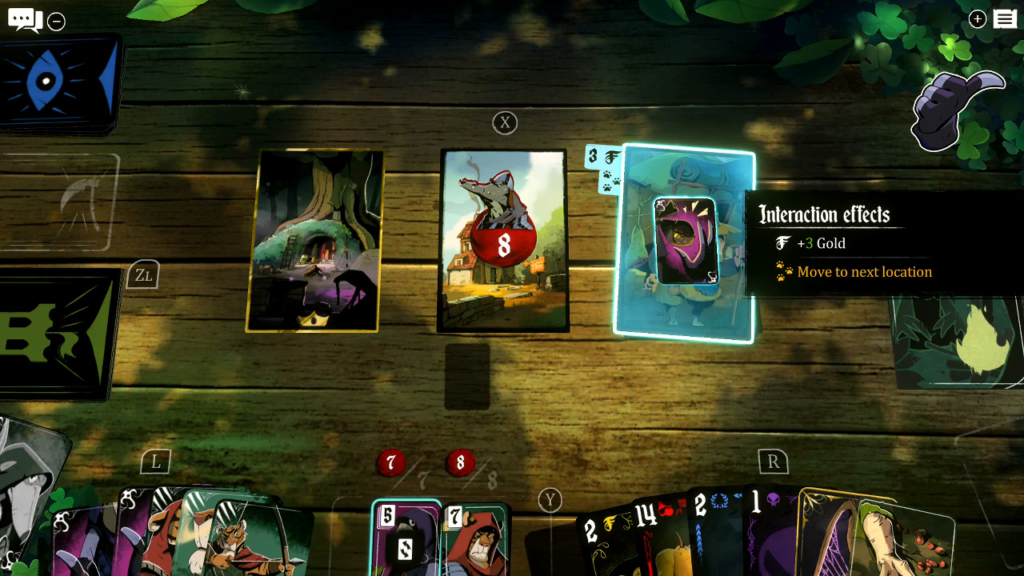
It would be reductive to state that Foretales feels tedious because the entire game is playing action and resource cards on location and character cards. It’s less reductive to observe that the same few solutions work in almost every mission. Volepain, as the only character I am required to bring on every mission, is the most noticeable offender. His Peppery Diversion card is always good for creating a distraction. A needed item can always be stolen with the Nimble Hands card.
A lack of card variety is the main cause of my malaise. Despite the variety of characters, their decks don’t evolve much from the half-dozen or so unique cards they have when joining the quest. Completing hidden objectives in certain missions unlocks a new card or two for most characters, but from beginning to end their basic and limited kit remains their primary method of interacting with the world. They feel stagnant, which makes my experience stagnant. For all the complexities of Foretales’ card-based rules, it seems afraid to make the characters have interesting and deep decks.
I can put up with a single playthrough of a videogame I’m not particularly enjoying, but feeling tedious on a moment-by-moment basis is only the first of Foretales’ several serious problems.
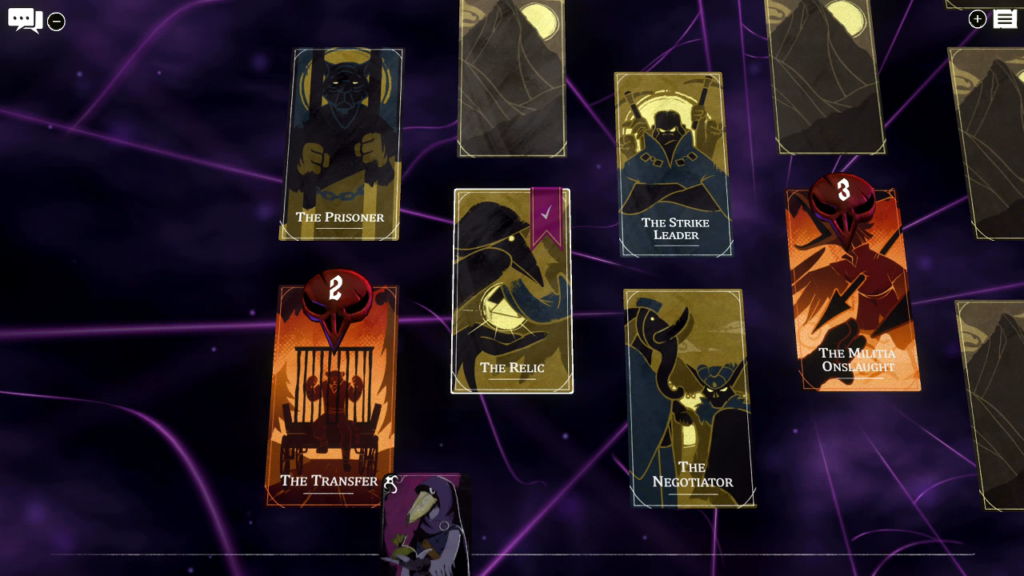
Foretales is built on a set of interrelated missions represented by, of course, cards laid across a table. I work my way across the network one card at a time. Some cards are dark red and represent Volepain’s most dire premonitions. They are stamped with a number which lowers with every mission the party completes, counting down to events which force the party along to the next story beat. There is never enough time to finish every available mission before the number reaches zero, mandating that I prioritize certain tasks over others. This is where Foretales makes its biggest mistake.
It has been my standard to beat a videogame before I write a single word about it for this website. Foretales has the curious distinction of being the first for which I have broken this standard. I made this decision because of something Foretales does not trouble itself with telling me: There is one path through its missions I must follow to see the ending. There are no bad endings. There are no alternate endings. There is only the ending. If I do not make all the right choices, Volepain is returned to the first fateful decision on the mission map, the many hours I spent working across it dismissed as premonitory shadows in his tormented mind.
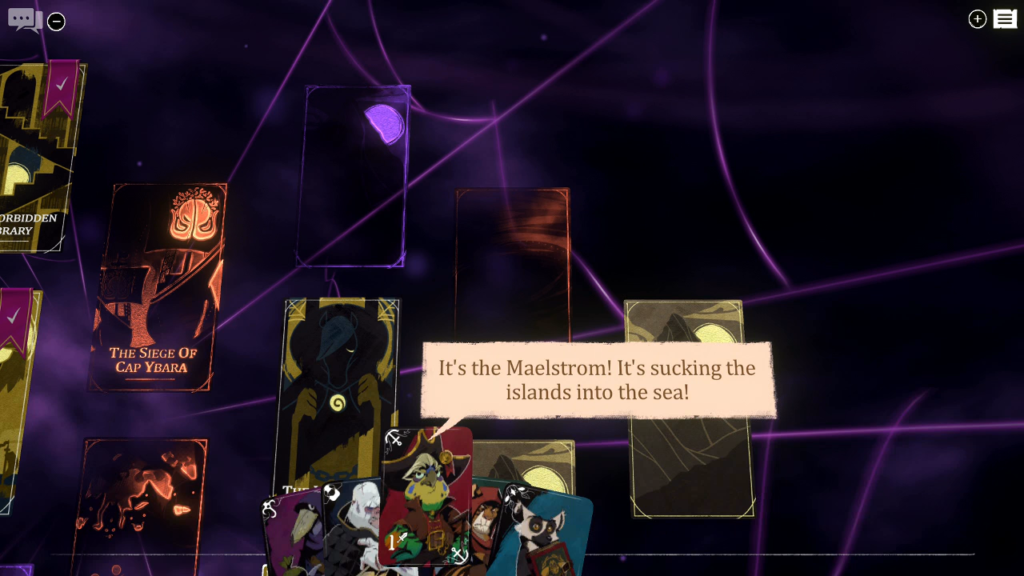
Building a videogame around premonitions and time loops already rubs shoulders with tedium. Experiencing the same events repeatedly can be fun, and has been successfully executed before. They can also feel repetitive or aggravating, even purgatorial at their most Groundhog Day-like extremes. Foretales blunders headlong into this mistake. Add that my first visit to any mission already feels like repeating the same actions the party used in previous missions, and this sensation quickly becomes a compounding problem. It is true that I can finish a mission much more quickly upon a revisit since I know the exact steps needed to finish its goals. But I ask: Why should I have to? If I can breeze through a mission on autopilot, why should I have to replay it at all?
I have to muster all my patience to finish Foretales once. The prospect of slogging through its campaign twice, thrice, or however many mulligans it takes to navigate its labyrinthian mission web to find the ending does not sound appealing at all. After doing my best to make what seem like the right choices in the moment, being sucked into a vortex and kicked back to level one without warning or even an acknowledgment of my effort breaks me. I close the app and return the card to its case. I will never play Foretales again.
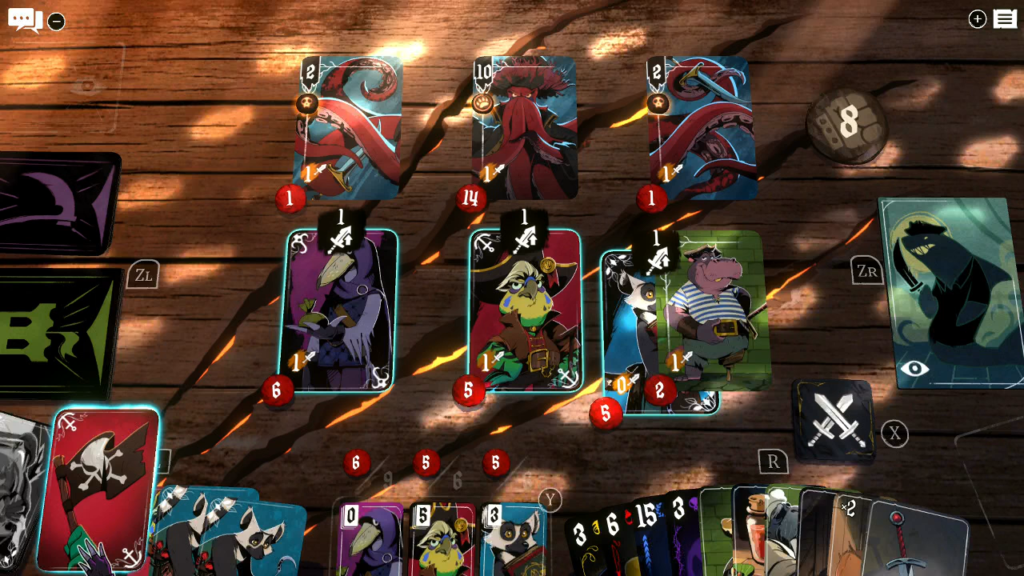
My standard is to beat a videogame before reviewing it. I make an exception for Foretales because I do feel that I have experienced everything it has to offer. The prospect of continuing to play and replay it, experiencing nothing new, my resentment growing with every loop, is not at all appealing. I’m a patient person. I do not have the patience Foretales requires of me. It disrespects my time and my effort, and it will disrespect yours too.